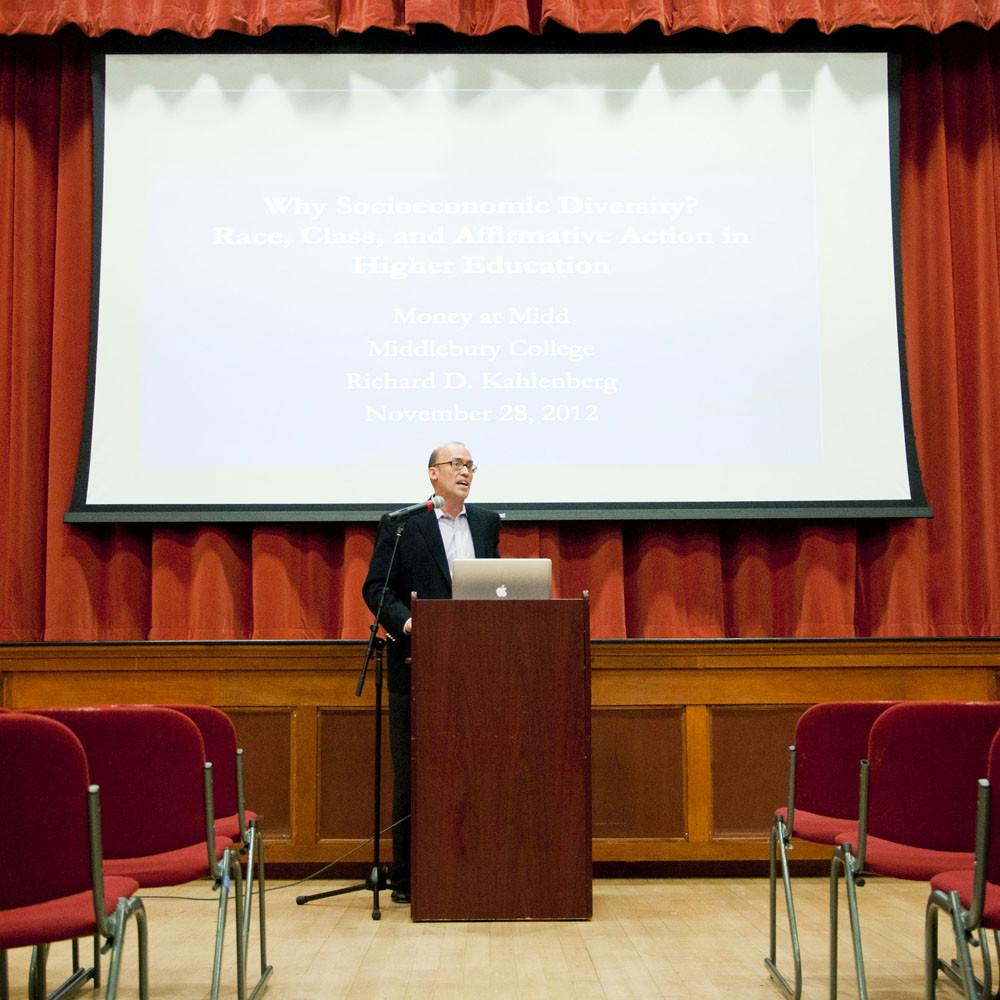On Wednesday, Nov. 28 students gathered in the McCullough Social Space to attend a discussion on socioeconomic diversity, race and higher education, led by Senior Fellow at the Century Foundation Richard Kahlenberg. The event was organized by Money at Midd, a group of students that works to address and discuss the role that money plays at the College.
Five students opened the lecture by stating the cost of their college education to them and their families. Kahlenberg applauded the students for the creative opening, noting that he was pleased to see students discussing their socioeconomic status in such a frank manner.
Kahlenberg provided information about present levels of socioeconomic diversity at selective colleges, before then suggesting reasons why he believed it was important for colleges nationwide to address these imbalances. Kahlenberg also addressed what he believes to be the root of socioeconomic disparity, and provided his analysis on the future of diversity on campus given recent legal and political attacks on racial affirmative action programs.
“Higher education is really the only way to assure upper or middle class status for adults,” said Kahlenberg. “Likewise, as more students go to college, it becomes important where you go to college.”
Kahlenberg stated that he believed that it was crucial for elite colleges to have socioeconomic diversity, recognizing that many of the students who study at the College and its peer institutions will go on to hold positions of leadership.
“We want at least some leaders to have personally known what it’s like to be on food stamps,” said Kahlenberg.
The speaker also explained that socioeconomic diversity helps promote racial diversity.
“Whites on average have about 20 times more wealth than African Americans,” he said.
A question and answer session followed the lecture.
One audience member asked the speaker how to create allies in upper-class white people on socioeconomic issues.
“Point out that diversity is good for their own upper class children,” replied Kahlenberg. “Demonstrate the ways that socioeconomic diversity can enhance their education.”
Overall, audience members seemed pleased with the lecture and the discussion it generated.
"I feel like class inequalities at Midd are pretty startling and every time someone throws out a number at me, I always wish it were different,” said Anna Shireman-Grabowski, ’14.5, who asked a question at the lecture about whether preferential treatment was given to students whose families had donor potential. “It’s something we in the community need to look at and address, and it plays out in our future of life at Middlebury. It's nice to see events like this.”
On Thursday, Nov. 29, Money at Midd also hosted a panel on accessibility, race, class and affirmative action at Middlebury.
Panelists for the event included Peggy Nelson, professor of sociology, Tiffany Sargent, director of civic engagement, Jackie Davies, student services director, Gregg Buckles, dean of admissions and Charlie Arnowitz ’13, Student Government Association (SGA) president.
All agreed that having such discussions on campus about socioeconomic diversity are extremely important, especially coming from the students themselves.
"The people who have the strongest voice and have the most power to affect change is the students,” Sargent said. “The administration is trying to figure out these issues; but if their actions don’t match your goals, then by all means vocalize them," she said, addressing students directly.
Yet several panelists acknowledged that many find it challenging to have discussions about socioeconomic diversity and class.
"Money is the most awkward topic, no matter where you are,” said Arnowitz. “People will talk about politics and religion at cocktail parties and it's still less awkward than talking about money."
When the panel was finished, Sam Koplinka-Loehr ’13, one of the Money at Midd organizers, asked audience members to turn to those beside them to speak about the issues that had been discussed.
Koplinka-Loehr posed two questions to audience members.
“What is the biggest barrier that you face in engaging on issues of money and socioeconomic class in your life, and how do guilt and anger enter into these conversations?” he asked the audience.
Koplinka-Loehr then invited groups to discuss a time at Middlebury in which they felt completely alone in some part of their identity, their socioeconomic background and a time in which they had witnessed classism.
Both events were organized by Money at Midd members Sam Koplinka-Loehr, Carter Kelly ’15, Sarah Bates ’14 and Jay Saper ’13.
“Our work primarily stems from working to break through the pervading silence that many feel on Middlebury's campus surrounding issues of class and money…Talking honestly about these issues can be very difficult as money and class relate to almost every aspect of our lives,” said Koeplinka-Loehr.
“Despite their importance, Middlebury students and staff rarely talk about these issues,” continued Koeplinka-Loehr. “How often have you talked with the cleaning staff in your building about socioeconomic class on campus? What about your roommate? Your best friend? Administrators? How is it that we so rarely engage these conversations?
“Money at Midd works to create space for these critical conversations to happen.”
Panels Discuss Money And Race

Comments



